Tag: sports
National treasures
7 April 2011 | This 'n' that
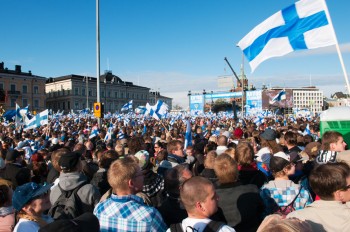
The name of the game: ice hockey. Photo: Jaakko Oksa
In Japan, artists or craftsmen of the highest quality may be honoured with the title ‘Living National Treasure’. In Finland, it seems only ice hockey players are eligible for that title, if you ask the man on the street, as ice hockey seems to be Finland’s ‘national’ sport.
(For example another ice team sport, synchronised skating, doesn’t compete in the same national treasure series, despite the fact that the Finnish team won the gold – again – in the World Championships in April. [Finland has won gold six times, Sweden five.] No national flag-waving resulted. But of course they are just women, who don’t win sports wars against other nations.)
On Sunday, 15 May, a dream came true at last, as Finland won the gold medal at the Ice Hockey World Tournament. And what’s more, it was Sweden – neighbour and old colonial overlord – they beat (6–1).
As the victorious team, escorted by a Hornet fighter from the Finnish air force, returned from Bratislava to Helsinki on Monday night, some 100,000 people crowded the capital’s Market Square to celebrate. The team and a selection of pop musicians climbed up on a stage to start the party – and President Tarja Halonen also popped in, from her presidential palace by the Square, to congratulate.
When’s the last time when 100,000 Finns gathered anywhere? Perhaps in 1995, when Finland first won the same title? See the series of photographs on the Internet pages of the Swedish paper Aftonbladet, particularly a shot of Helsinki harbour taken with a fish-eye lens.
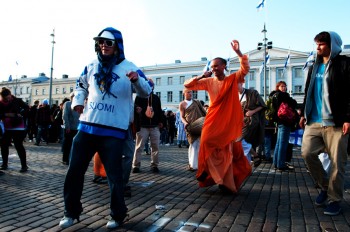
All together now! Photo: Jaakko Oksa
Sweden has been a much more successful hockey country than Finland, but it’s clearly tough to be a good loser. As the rivalry – in sports in particular – between Sweden and Finland is traditionally a larger-than-life issue, the Swedish newspapers and their readers displayed a highly amusing spectrum of opinions. ‘Kul att dom får fira något. Dom bor ju trots allt i Finland’ (‘Great that they have something to celebrate. After all, they live in Finland’), said one reader sourly.
And celebrate they did. One of the coaches stumbled and fell on his face on the red carpet on landing in Helsinki, and before you could say oops, he ended up on the YouTube accompanied by extracts from the final match television coverage by the celebrity sports commentator Antero Mertaranta.
Sportsmen and -women are supposed to be positive role models for young people, but as some of the team members clearly seemed to enjoy something stronger than sports drinks on the Market Square, they have been reproached for this behaviour by many people – spoilsports?
The coach of the Finnish national team, Jukka Jalonen, said in an interview that he could not condemn the use of alcohol in celebrating a ‘rare achievement’ like this, as ‘children and young people surely understand that adults may sometimes get drunk. Many of them have seen their parents sloshed.’
Well, if we assume it’s OK to be drunk in front of your children, it is no wonder that younger and younger children start drinking – which, however, is not considered OK, not by anyone. Can someone explain this?
We are the champions
25 March 2011 | Prose
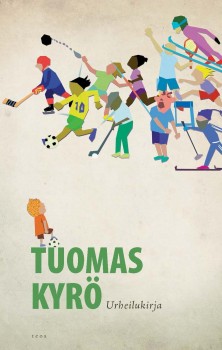 Heroes are still in demand, in sports at least. In his new book author Tuomas Kyrö examines the glorious past and the slightly less glorious present of Finnish sports – as well as the meaning of sports in the contemporary world where it is ‘indispensable for the preservation of nation states’. And he poses a knotty question: what is the difference, in the end, between sports and arts? Are they merely two forms of entertainment?
Heroes are still in demand, in sports at least. In his new book author Tuomas Kyrö examines the glorious past and the slightly less glorious present of Finnish sports – as well as the meaning of sports in the contemporary world where it is ‘indispensable for the preservation of nation states’. And he poses a knotty question: what is the difference, in the end, between sports and arts? Are they merely two forms of entertainment?
Extracts from Urheilukirja (‘The book about sports’, WSOY, 2011; see also Mielensäpahoittaja [‘Taking offence’])
The whole idea of Finland has been sold to us based on Hannes Kolehmainen ‘running Finland onto the world map’. [c. 1912–1922; four Olympic gold medals]. Our existence has been defined by how we are known abroad. Sport, [the Nobel Prize -winning author] F. E. Sillanpää, forestry, [Ms Universe] Armi Kuusela, [another runner] Lasse Viren, Nokia, [rock bands] HIM and Lordi, Martti Ahtisaari.
The purpose of sport at the grass-roots level has been to tend to the health of the nation and at a higher level to take our boys out into the world to beat all the other countries’ boys. We may not know how to talk, but our running endurance is all the better for it. However, the most important message was directed inwards, at our self image: we are the best even though we’re poor; we can endure more than the rest. Finnish success during the interwar period projected an image of a healthy, tenacious and competitive nation; political division meant division into good and bad, the right-minded and traitors to the fatherland. More…
Homo ludens, vita brevis
18 March 2011 | Letter from the Editors
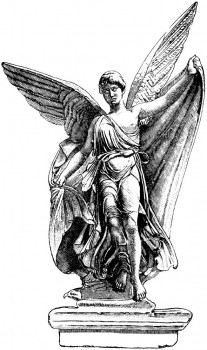
Goddess of victory: charioteer and runner Nike (constructed from the damaged statue of Nike of Paionios, from ca. 420 BCE). Photo: Wikimedia
No one should ever start a piece with ‘already the ancient Greeks…’ , but here goes:
Already the ancient Greeks practised the noble arts of sport. The Romans extended the cultivation (their word!) of culture to leisure, amusing themselves by throwing Christians to the lions. Formula F1 came a couple of thousand years later, as did post-modern art, sitcoms and reality TV, whose presenters take the place of lions and whose celebrities are today’s Christians.
The Olympics, founded by the Greeks, were in full swing as early as the seventh century BCE, until the Christian Roman Caesar Theodocius I banned them as irretrievably pagan in the year 393. However, they were revived 1,500 years later. More…
Tuomas Kyrö: 700 grammaa [700 grams]
12 November 2009 | Mini reviews, Reviews
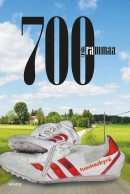 700 grammaa
700 grammaa
[700 grams]
Helsinki: WSOY, 2009. 379 p.
ISBN 978-951-0-35601-2
€ 30, hardback
The genre of the picaresque novel is doing well, and one of its foremost exponents in Finland is Tuomas Kyrö (born 1974). The plot of his ingenious first novel, Nahkatakki (‘Leather jacket’, 2001), revolved around a jacket that moves from one owner to another. His later novels maintain this comical tension, but with a deepening of themes and a more sober outlook. Liitto (‘Union’, 2005) portrayed people scarred by war, while Benjamin Kivi (2007, featured in Books from Finland 4/2007) retold Finland’s history in a light-hearted and anachronistic manner. 700 grammaa is a book about sports fever and family relationships, the exploration of love and the pursuit of dreams. The main character is a boy who at birth weighs only 700 grams, and whose father vows to perform a seven metre long-jump if his son survives. He does, and the father has to devote his life to this almost impossible sporting achievement This novel, with its fast-developing plot and varied narrative techniques, is a paean to the heroism latent in mediocrity.
Jarkko Nieminen: Pelaamisen lumo [The fascination of the game]
20 August 2009 | Mini reviews, Reviews
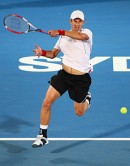 Pelaamisen lumo [The fascination of the game]
Pelaamisen lumo [The fascination of the game]
Helsinki: Avain, 2009. 175 p., ill.
978-952-5524-69-7
€ 38, hardback
Tennis is a curious game, as everyone who plays it knows – and even those who don’t, which is why it is such a popular sport. Although Jarkko Nieminen (born 1981), a professional player since 2000, has not yet won a Grand Slam event for Finland, in 2006 he was ranked no. 13. (Unfortunately, this spring Nieminen injured his wrist and missed the top matches of the season.) In this book (edited and published by his sister Anna-Riikka Carlson, who founded the publishing company Avain in 2003), Nieminen tells the story of his athletic career. ‘In Japan my visa said I was an “entertainer”,’ he recalls as he describes what it’s like to walk out on a court filled with thousands of spectators. Tennis is a gentleman’s game, a polite duel (or double), and Nieminen is certainly a gentleman par excellence. His personal story is designed to be strictly informative, as he chooses to keep his family life private, for example (his wife Anu, née Weckström, a Finnish multiple badminton champion, is referred to once). There is no doubt, though, that the reader will be convinced of Nieminen’s happy choice of an athletic profession.
